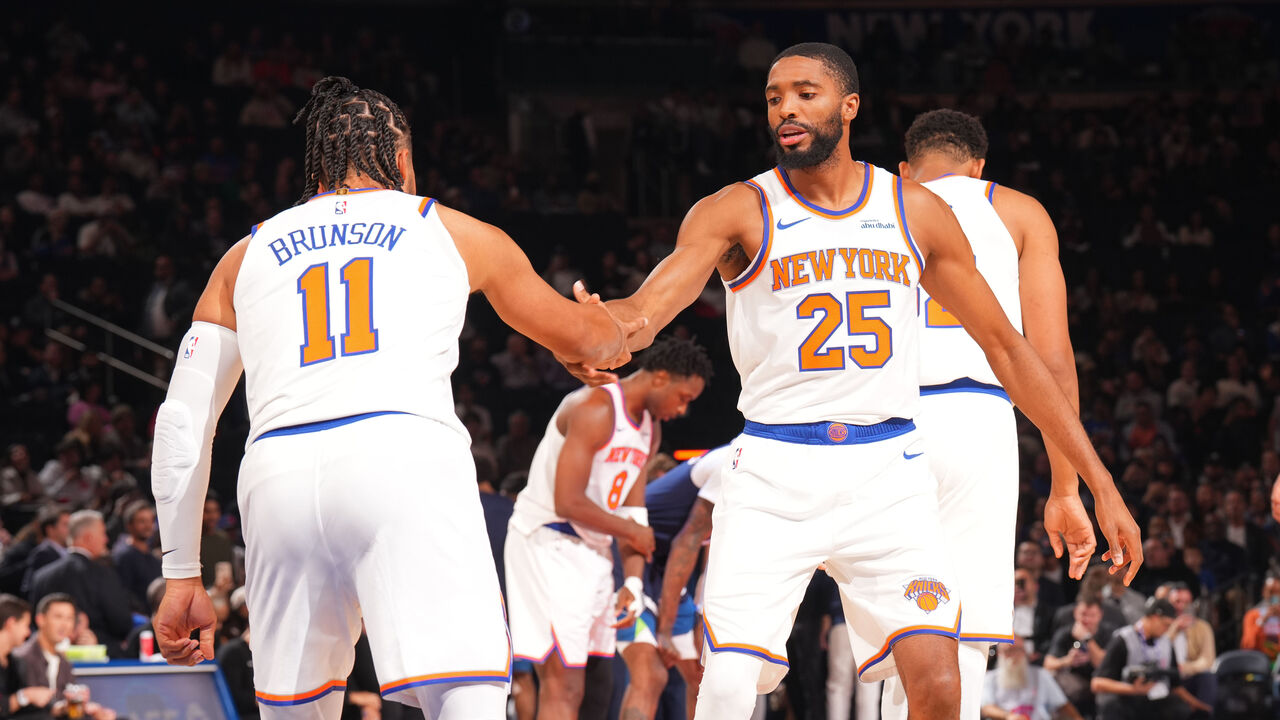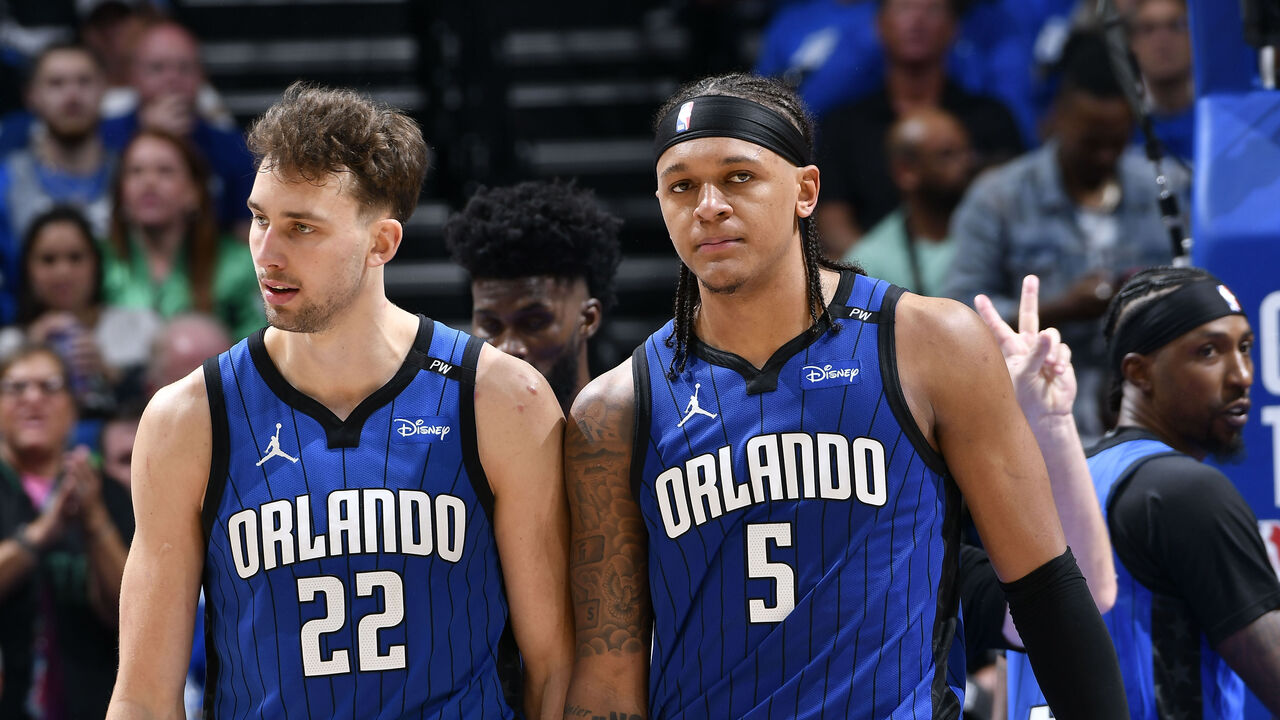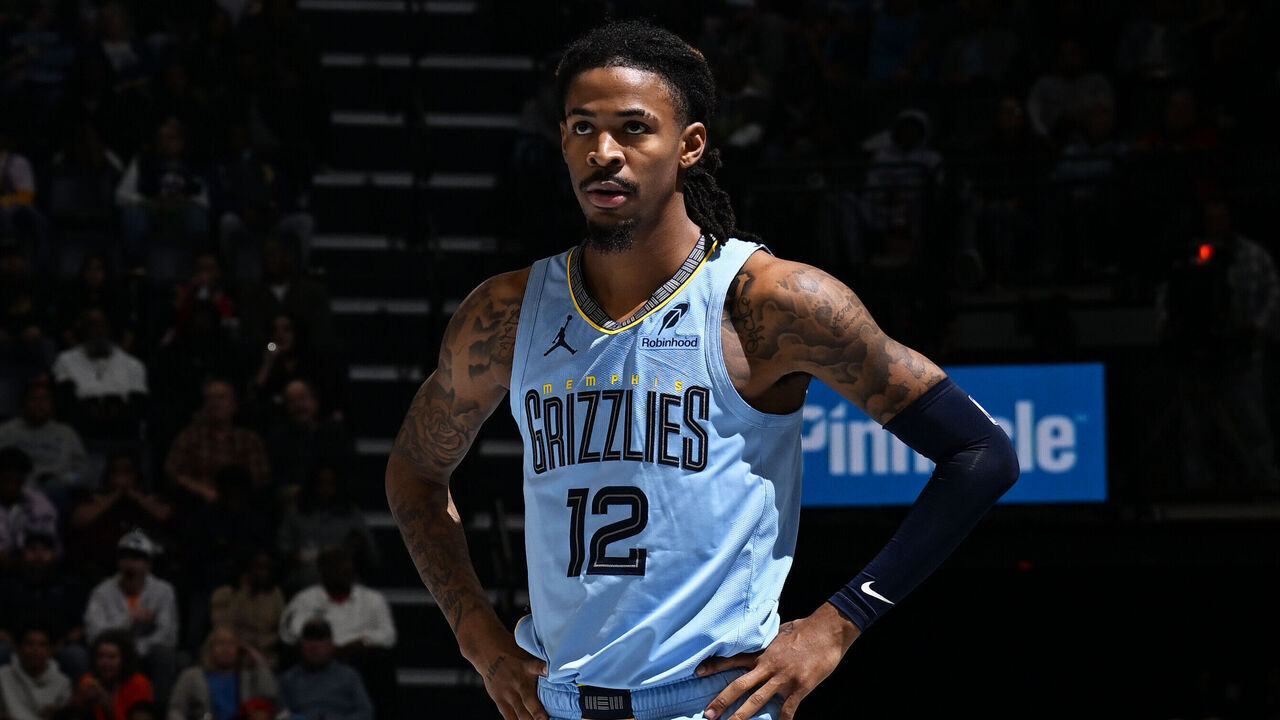NBA Behind the Numbers: Knicks move the rock, Morant's steady decline
Welcome to NBA Behind the Numbers, a recurring look at noteworthy statistics and trends across the league, and the impact they're having.
The Good
104.9 - Wemby's defensive presence
The Victor Wembanyama dilemma is simple when he's near the rim: the towering Frenchman either deters a potential shot or forces a brave soul to attempt one that he'll almost certainly block, or at the very least alter.
This, in turn, creates an impossible equation for opponents trying to pry him away from the basket. Not only does the 7-foot-4 unicorn cover ground so quickly that he virtually cuts the floor in half, but he also excels at rotating on drives and moving his feet when switched onto guards.
The 8-3 Spurs own a 104.9 defensive rating when Wembanyama's on the floor, the NBA's second-best mark. That number jumps to 117.9 when he's sitting, ranking as the sixth-worst.
On the offensive end, Wembanyama's improved shot selection has limited his 3-point attempts and boosted his efficiency. Yet, even with his strides, the Spurs are scoring five more points per 100 possessions with him off the court. While Wembanyama's offensive evolution remains a work in progress, particularly in passing out of double teams and capitalizing on mismatches, he's the most impactful defensive player in decades.
100.5 - Playing with pace
Erik Spoelstra has made a habit of frantically circling his arm as he hurries to the boundary of the coaches' box following a defensive stand. His message to his squad is clear: "Go." The strategy has propelled Miami to become the fastest team in the league after posting the fourth-slowest pace last season.
The rationale isn't complicated: the faster a team plays and the earlier it shoots, the more possessions it'll earn. The Heat averaged 98.3 possessions per game in 2024-25 and has increased that to 107.8 this campaign. More possessions equal more opportunities to score. It's also easier to create an advantage against a defense rushing back than against one set in the half-court.
Although Miami is a dramatic example of increased pace, playing faster is a league-wide trend. The NBA's average pace of 100.5 possessions per contest this season is on track to be the highest since 1988-89. Pace has steadily risen over the last decade, but the success of the 2024-25 Pacers has accelerated it further. The league's talent surplus also creates greater depth, enabling teams to play at a faster pace and utilize their entire benches. This trend is unlikely to slow down anytime soon.
306.2 - Knicks passing the rock

Mike Brown's imprint on a reinvented Knicks offense is evident in its emphasis on getting into actions early, player movement, and forcing the defense to make various decisions on every possession. The days of Jalen Brunson endlessly dribbling out the clock before creating a late shot are over. Brunson's time of possession is down, New York is shooting earlier in the clock, and the team's 3-point rate has climbed. Perhaps most telling is the Knicks' increase in passes per game, reflecting their renewed commitment to improved ball movement.
New York is averaging 306.2 passes, which is the fifth-most in the NBA and 25 more than the club recorded last season, when it ranked in the bottom half. The Knicks are moving the ball from side to side and creating advantages by gifting players drive-and-kick opportunities. The result is more quality looks from deep. New York leads the NBA in open made threes per game and owns the third-best offensive rating, scoring three more points per 100 possessions than last year's team with the same personnel.
The Bad

10.6 - Orlando's futility from deep
If you can't shoot, you can't score. If you can't score, you can't win. Groundbreaking stuff. While the Magic's defense has been unusually porous, the offense remains the primary issue and the reason Orlando's off to a disappointing 6-6 start.
The Magic make the second-fewest threes per game (10.6) and attempt the fourth-fewest (31.5). Both of those numbers are down from last season, when Orlando ranked last in 3-pointers made (11.2 per game). Desmond Bane, a career 40% 3-point shooter, was supposed to turn the Magic's shooting around, but he's connecting on a career-low 30% on 4.4 attempts from deep. Being sent to Orlando is a death sentence for shooters. Just ask Kentavious-Caldwell Pope.
Though Jamahl Mosley's system and the lack of a true point guard merit blame for the Magic's offensive woes, their best players just can't shoot. Paolo Banchero (a 31% career 3-point shooter) and Franz Wagner (a 32% career 3-point shooter) have never fully developed long-distance shots. Even if Bane improves, the Magic will never have the 3-point prowess of a contender.
66.3 - Celtics not cleaning the glass
With seconds remaining in the Philadelphia 76ers and Boston Celtics' third meeting of the season Tuesday night, Philly attempted a three with the game tied at 100. The shot clanked off the rim before Sixers' Kelly Oubre Jr. put back the game-winner. The sequence underscored the most concerning part of Boston's 6-7 start: defensive rebounding.
Much of the Celtics' rebounding struggles stems from the departures of Kristaps Porzingis, Al Horford, and Luke Kornet. Boston's lineup now includes either Neemias Queta or Luka Garza at center, or a small-ball lineup featuring neither. Additionally, the absence of Jayson Tatum's team-leading 8.7 rebounds per game also stings.
Every scouting report against the Celtics urges teams to crash the offensive glass against the NBA's weakest frontcourt. Boston's 66.3% defensive rebounding rate ranks third-worst in the league, meaning opponents are grabbing an offensive board on nearly 34% of opportunities. The Celtics are also surrendering the sixth-most second-chance points. Offensively, they're struggling to score on the inside, posting the third-fewest points in the paint. Boston's frontcourt futility has them outside the play-in picture.
The Ugly

24% - Morant not getting to the rim
The Grizzlies are figuring out how to handle disgruntled dignitary Ja Morant, who seems to spend more time studying the Jimmy Butler exit strategy than his own playbook.
Lost in the equation of Morant's antics in Memphis is that he's no longer a star-caliber player. His points, assists, field-goal and 3-point percentage, and drives per game have all steadily dropped over the last five years. The most concerning statistic regarding Morant's demise is how infrequently he attacks the rim.
Nearly 50% of Morant's shots came at the rim in the 2021-22 season, but that percentage has declined in each subsequent year, dipping to a career-low 24% this campaign. He's also averaging 18.9 points, the fewest since his sophomore season, on a career-worst 35.2% field-goal percentage. There's a correlation between Morant's rim attacks and the Grizzlies' offensive success, especially since he's a career 31% 3-point shooter.
Memphis reimagined its offense last campaign by running the fewest pick-and-rolls in the NBA, which didn't suit Morant's play style. After replacing head coach Taylor Jenkins with Tuomas Iisalo, the club is back to spamming pick-and-rolls at an above-average rate. However, Morant is scoring 0.74 points per pick-and-roll, which ranks in the 34th percentile.
Whether it's varied injuries or declining athleticism contributing to Morant's reluctance to attack, the question remains: How valuable is the former No. 2 pick if the downhill driving that once catapulted him into conversations as a potential face of the NBA becomes a thing of the past?
103.47 - Mavs' historically bad offense
To contextualize how awful the Mavs' offense has been this season, consider this: Their 103.47 adjusted offensive rating is the worst since the 2015-16 Sixers (99.83), whose 10 wins were the second-fewest in NBA history, per Basketball Reference. Dallas is 3-9 and averaging a league-low 107.8 points per game.
Anthony Davis' absence hurts, but the real offensive issues lie with the Mavs' guards. Kyrie Irving is recovering from an ACL injury, Klay Thompson is having the worst shooting season of his career, and Jason Kidd doesn't trust D'Angelo Russell to play more than 21 minutes per night.
Cooper Flagg is having a mercurial start to his career, but any blame falls on the organization instead of him. He's at his best playing alongside a point guard, and there isn't a reliable one on the roster. A rookie can't be expected to be the primary creator on a quality team. If only Dallas had one of the greatest offensive players of this generation. At least the mastermind behind the Luka Doncic trade is finally gone.
Sam Oshtry is a sports writer at theScore. You can follow him on X @soshtry for more basketball coverage.
HEADLINES
- Hawks' Johnson explodes for gigantic triple-double in win over Jazz
- Barnes, Raptors claw past Cavs for 6th win in 7 games
- Report: Brunson out vs. Heat with Grade 1 ankle sprain
- Booker scores 33 to lead Suns to 5th straight win by beating Pacers
- Banchero out with strained groin, return timeline uncertain